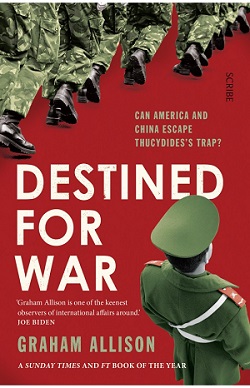“Let China sleep; when she wakes, she will shake the world.” said Napoleon more than two hundred years ago and quoted by the author in the very first chapter of the book which talked about the rise of China. The author contends that the growth of China will lead to conflict with the USA, an existing superpower, which may result in war. To back his argument the author draws the example from the Peloponnesian War between two Greek states—Sparta, an established power, and Athens, a rising power. The entire argument is built on the depiction of the ancient Greek historian Thucydides who wrote about every aspect of the Peloponnesian War. Thucydides’ work is a thorough analysis of how war started, what it caused, the aftermath of the war, how it could have been avoided, and what were the factors and actors involved; It also guides how to avoid getting into Thucydides’ trap, which holds that as one nation rises, another becomes insecure and conflict breaks out.
Graham Allison skilfully linked the past and present and uncovered 16 instances in modern history where Thucydides' trap caused war (12 times) or nearly caused war but was averted (4 times); to name a few, these instances include US-Japan (mid-20th century; resulted in war), US-Soviet Union (late 1940s–early 1980s; averted war), and UK-US (early 20th century; averted war). The most recent and ongoing case of Thucydides’ trap is of America and China, where America is the ‘ruling power’ and China is the ‘rising power’, and the entire idea of the book is based solely on this scenario and how it affects the world order. Given the author's stellar academic credentials and career as a former Pentagon advisor, consultant, and special advisor to the US Secretary of Defense, it is not surprising that this book offers such a broad perspective on wars and the world order in different eras while still leading to the same concept of Thucydides' trap and making it seem as though history is being repeated invariably.
With all the data, the author makes a compelling case for how a nation that America nurtured in order to further its narrow foreign policy objectives (focussing only on the Soviet Union/Russia) completely surpassed it. That same nation has since outperformed America in almost every sphere of development, from economic growth (of the kind that the West achieved in the centuries following the Industrial Revolution, China attained in 30 years) to being a manufacturing powerhouse of the 21st century, from STEM revolution to military capabilities (China surpassed US to have the biggest Navy in the world) and came out as the "biggest player in the history of the world" (p.21). Without a question, China is advancing and gaining control of markets and institutions that were formerly dominated by America. The author has also discussed how China utilised geo-economics as a diplomatic instrument to undermine the current America-centered international order and establish its own China-centered international order. China's ambitious BRI is the most notable example of this. At the same time, China is also coming up with new China-centred multilateral forums like SCO, AIIB, and BRICS as an alternative to US-dominated institutions.
In the book, Graham Allison draws an interesting parallel between Sparta, an established state (like America), and Athens, a rising power (like China). However, while the author was comparing the two states, the differences in the ideologies, structures, and values of the two comparable states were largely overlooked. For example, Athens was an open society, in contrast to China, whereas Sparta was a centralised garrison state, unlike democratic liberal America. This could be the main deterrent to war. But, there were a number of key reasons that when combined led to war (in case of Athens and Sparta) and are extremely likely to produce conflict in the present day, like the involvement of a third country or ally (in present case Taiwan and North Korea), defensive deterrent (military exercises and navy drills near each other's border), asylum to runaway people, popular pressure to retaliate (especially in democracies like the US, for example, War on Terror), ‘Rising power syndrome’ & ‘Ruling power syndrome’ (p.44) where the sense of self-worth, interest, and respect are enhanced in a rising state, but the sense of insecurity and dread of fall is enhanced in a ruling state.
The author has emphasised the value of learning from history repeatedly and has cited the examples of 16 conflicts between rising and ruling states over the course of the last 500 years, interestingly in all cases, it started with rapid economic development of rising power followed by military development, followed by dominance in the region and monopoly on resources and ultimately war. The book also exposes the United States' lack of a generational long-term foreign policy toward a growing China and instead of examining China's main interest, which is its sovereignty, US offers improvisation and concessions on different issues which makes conflict inevitable. American foreign policy's lack of long-term vision has largely contributed to what China is now, so to avoid any future confrontation the author also makes recommendations like having clarity on the core interests of both countries, developing communication infrastructure instead of rhetoric, and having both countries look inwards and put internal threats at the forefront instead of getting insecure of each other to avoid falling into Thucydides' trap.
The book describes various incidents that revolved around Thucydides’ trap, but it would have added more to the concept if, first, the role of the other major powers had also been discussed in the conflict between the ruling and rising powers. Even in the present day, we can observe how middle powers are crucial in forming the strategy of superpowers. Second, the multi-polar world is completely overlooked and the book only takes into account unipolarity and bipolarity. Overall, this outstanding book offers a comprehensive outlook on war and a means of averting future conflicts that have historically wiped out entire societies.










Awesome
Post new comment